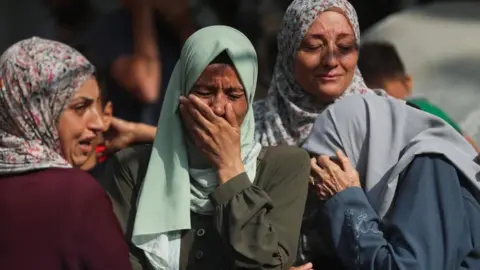 Reuters
ReutersMore than 60,000 people have been killed as a result of Israel’s military campaign in Gaza since October 2023, the Hamas-run health ministry says.
It said on Monday the death toll had reached at least 60,034, including 18,592 children and 9,782 women.
At least 112 people were killed in the 24 hours before late Tuesday morning, with 22 people killed while trying to get aid, the ministry said.
Women and children were among those killed in overnight and morning strikes on homes, hospital sources and witnesses told the BBC.
Israel launched its offensive in response to the Hamas-led attack on southern Israel on 7 October 2023, in which about 1,200 people were killed and 251 others taken hostage.
In the central Nuseirat area, al-Awda Hospital said 30 people, including 14 women and 12 children, were killed in attacks on homes overnight and on Tuesday morning.
Many of those killed were related, with 19 named as members of the Abu Ataya, Siyam and Nabhan families.
Four members of the al-Agha family were killed and others injured in an Israeli strike on a tent sheltering displaced individuals in the coastal area of Al-Mawasi in Khan Younis, according to Nasser Hospital.
Nine others were killed in Khan Younis, local hospital sources and witnesses say.
In Gaza City, two people were killed and several others wounded in an Israeli missile strike on an apartment belonging to the al-Batsh family, Al-Shifa Hospital said. A later strike killed five members of one family.
Rescuers have been struggling to reach casualties from another strike.
Al-Awda Hospital also said at least 14 people had been killed and more than 100 injured by Israel Defense Forces (IDF) near an aid distribution point in central Gaza.
The IDF said that “contrary to the reports, following a review conducted, the IDF is not aware of casualties as a result of IDF fire adjacent to the distribution site in the central Gaza Strip”.
The IDF said it had struck “several terror targets” in Nuseirat and had taken steps “to mitigate the risk of harming civilians”.
The BBC has asked for comment about the other strikes.
In a statement on Telegram, the IDF said it had “eliminated several terrorists who posed a threat” and “targeted terrorist infrastructure and multiple weapons storage facilities” over the past day in Khan Younis.
It also said it had eliminated “several terrorists” and dismantled “terrorist infrastructure both above and below ground” in northern Gaza, and had “struck dozens of terror targets” across the Strip.
The UN says more than 1,000 Palestinians have been killed by the Israeli military while trying to get food since 27 May. Most were near distribution sites run by Israeli- and US-backed organisation Gaza Humanitarian Foundation (GHF), which started operations in late May, and others near UN and other aid convoys.
Tuesday’s incident was related to aid convoys and not a GHF site.
Israel says its troops have only fired warning shots and that they do not intentionally shoot civilians.
The GHF says the UN is using “false” figures from Gaza’s Hamas-run health ministry.
Meanwhile, a senior Hamas official told BBC News on Tuesday that the group’s negotiators had informed mediators from Qatar and Egypt it would halt indirect talks with Israel while there is starvation in Gaza.
It comes after Israel and the US walked away from negotiations last week. The US said Hamas was not negotiating in “good faith”, while Netanyahu said he was “considering alternative options” to return the hostages still being held in Gaza.
Significant gaps remain between Israel and Hamas in the talks, including Israeli troop withdrawals, aid distribution and a permanent end to hostilities.
Dire warnings about hunger spreading in Gaza continued on Tuesday, with UN-backed global food security experts warning the worst-case scenario of famine is “currently playing out” in the Gaza Strip.
While Israel continues to insist it is not responsible for the humanitarian catastrophe in Gaza and does not impose restrictions on aid entering Gaza, those claims are not accepted by its close allies in Europe, or the United Nations and other agencies active in Gaza.
On Sunday, Israel, which controls all entry of goods into Gaza, began what it said would be daily 10-hour “tactical pauses” to allow for humanitarian aid delivery, and announced the establishment of “designated secure routes” for aid convoys.
The tactical pauses are taking place from 10:00 (07:00 GMT) to 20:00 in three areas, meaning that air strikes are continuing overnight and elsewhere in the Strip.
Israel has also allowed aid drops by foreign countries to resume, despite humanitarian agencies warning that the method was ineffective and dangerous.
Israel has questioned the health ministry’s figures, which do not distinguish how many of the dead are members of Palestinian armed groups.
Israel’s military said at the start of the year that 20,000 members of Hamas and Palestinian Islamic Jihad had been killed during the war. Earlier this month, the military’s chief of staff said it had struck more than 1,300 “terrorists” in recent weeks.
International journalists, including the BBC, are blocked by Israel from entering Gaza independently, so are unable to verify figures from either side.
In the past, figures from the health ministry were widely used in times of conflict and seen as reliable by the UN and other international organisations.
Additional reporting by Rushdi Abualouf




